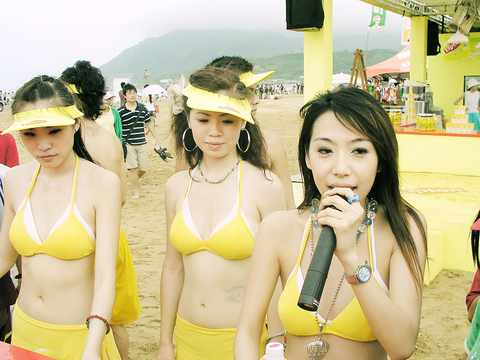First it was going to happen, and then it wasn't going to happen until later, then it did happen for a bit, and now it's canceled -- but only for now. The annual Ho-Hai-Yan beachside brouhaha (海洋音樂祭2005) got off to a start at Fulong (福隆) on Wednesday, two weeks after the original scheduled date and despite a host of problems, the last of which was a thundershower, the precursor of another typhoon.
Organizers were forced to cancel performances for last night and tonight. And as of press time last night, the official word was "wait and see" about shows scheduled for tomorrow and Sunday.
At least a fortunate few made it out on Wednesday for some five hours of live music that was originally supposed to last five days. A late afternoon rainstorm threatened to have the modest crowd head for home, but by 6pm, the rain had subsided, the bands had plugged in and the beach was booming.

PHOTO: TAIPEI TIMES
The beach itself figured prominently in the proceedings even before the party began. Long Taipei County's most popular beach, Fulong has in recent years been the site of substantial development built to accommodate weekend crowds. The scene here changed last year when the beach disappeared as a result of tidal changes caused by the construction of a wharf to service the Fourth Nuclear Power Plant.
When organizers began planning this year's Fulong festival, there wasn't much of a beach on which to put it. Indeed, the bridge that is the site's centerpiece led out to open water only weeks ago, according to organizers.
But any thought Wednesday night's partygoers might have had of wading out to the man-made peninsula was cut short at the tape lining the water's edge and by the guards standing sentry to prevent any would-be wading.
One concertgoer said that police were being overzealous and mentioned another beach party she attended at Baishawan two weeks ago, where police had also cordoned off the water.
"I don't understand the point of having [concerts and parties] at the beach if the police won't let you even get your feet wet," she said.
Later a voice announced that MC Hotdog was about to play and partygoers stopped messing about in the sand and sidled up to the front of the Big Blue stage.
Anyone who wasn't on their feet for his first number was for his second, I Love Taiwanese Girls (
"Why isn't Da Zhi more popular than MC Hotdog?" was one comment overheard. "He's so cool."
"He's so song!" was her friend's answer. Maybe a bit too "crude."
That's never stopped a hip-hop artist before.
Back on the main beach, a laundry list of smaller-name bands did their best to battle against the cacophony of sound coming from the main stage. With only their friends and family to block the noise, it was a losing battle.
Despite the first typhoon that postponed the festival, most of the international headliners were still able to play on the new dates. Only Canadian rapper Peaches had to bow out. Organizers made no mention of again rescheduling international acts, including Vincent Gallo, Melissa auf der Maur, Japan's Boom Boom Satellites, Baseball from Australia and Black Rebel Motorcycle Club from the US.
Visit http://hohaiyan.com/2005.htm for the latest on cancellations and rescheduling.

This is the year that the demographic crisis will begin to impact people’s lives. This will create pressures on treatment and hiring of foreigners. Regardless of whatever technological breakthroughs happen, the real value will come from digesting and productively applying existing technologies in new and creative ways. INTRODUCING BASIC SERVICES BREAKDOWNS At some point soon, we will begin to witness a breakdown in basic services. Initially, it will be limited and sporadic, but the frequency and newsworthiness of the incidents will only continue to accelerate dramatically in the coming years. Here in central Taiwan, many basic services are severely understaffed, and

It is a soulful folk song, filled with feeling and history: A love-stricken young man tells God about his hopes and dreams of happiness. Generations of Uighurs, the Turkic ethnic minority in China’s Xinjiang region, have played it at parties and weddings. But today, if they download it, play it or share it online, they risk ending up in prison. Besh pede, a popular Uighur folk ballad, is among dozens of Uighur-language songs that have been deemed “problematic” by Xinjiang authorities, according to a recording of a meeting held by police and other local officials in the historic city of Kashgar in

Jan. 5 to Jan. 11 Of the more than 3,000km of sugar railway that once criss-crossed central and southern Taiwan, just 16.1km remain in operation today. By the time Dafydd Fell began photographing the network in earnest in 1994, it was already well past its heyday. The system had been significantly cut back, leaving behind abandoned stations, rusting rolling stock and crumbling facilities. This reduction continued during the five years of his documentation, adding urgency to his task. As passenger services had already ceased by then, Fell had to wait for the sugarcane harvest season each year, which typically ran from

The People’s Republic of China (PRC) was out in force in the Taiwan Strait this week, threatening Taiwan with live-fire exercises, aircraft incursions and tedious claims to ownership. The reaction to the PRC’s blockade and decapitation strike exercises offer numerous lessons, if only we are willing to be taught. Reading the commentary on PRC behavior is like reading Bible interpretation across a range of Christian denominations: the text is recast to mean what the interpreter wants it to mean. Many PRC believers contended that the drills, obviously scheduled in advance, were aimed at the recent arms offer to Taiwan by the